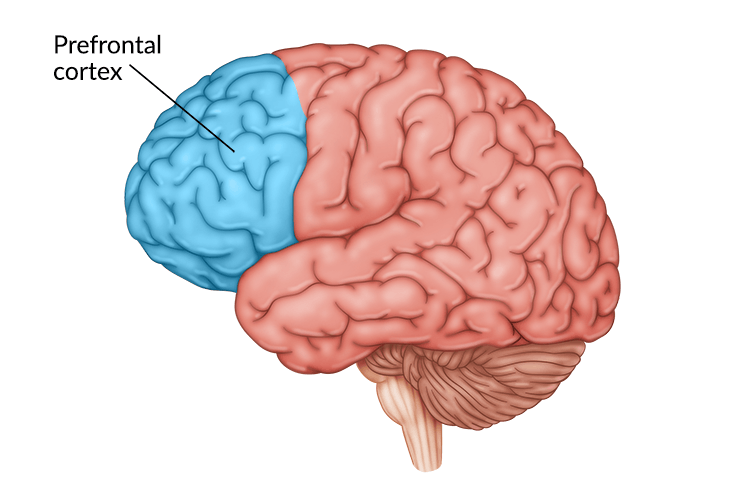Stopping Negative Self-Talk
by Dr. Liz, November 21, 2021


I’m a failure. I’m a joke. I’m so stupid. I’m not good at anything. This negative self-talk has many names – the inner critic, the judge, the gremlin, self-criticism – but whatever you call it, it’s an inner voice that “judges you, doubts you, belittles you, and constantly tells you that you are not good enough” (Vilhauer, 2016). And trash-talking yourself is stressful, can squelch your self-confidence, and can get in the way of your success.
The ADHD Brain and Negativity
 For someone with ADHD, the prefrontal cortex of the brain is unable to regulate the thoughts and
feelings that stream in and out. They tend to
rely on emotions to make decisions. This means they
tend to be hard on themselves and are quick to judge themselves negatively, which can lead to feelings
of guilt and shame.
For someone with ADHD, the prefrontal cortex of the brain is unable to regulate the thoughts and
feelings that stream in and out. They tend to
rely on emotions to make decisions. This means they
tend to be hard on themselves and are quick to judge themselves negatively, which can lead to feelings
of guilt and shame.
Origins of Negative Self-Talk
Negative feelings about ourselves start when we are children. They can come from parents, caregivers, family members, or influential adults like teachers or coaches. If a child with ADHD is constantly told to sit still, be quiet, try harder, or to stop being lazy, for example, the feelings of being “bad,” “wrong,” or “less than” become internalized and self-esteem can plummet. If an adolescent is constantly compared to a sibling and comes up short, struggles under a demanding teacher, or has negative experiences in personal relationships, these experiences can contribute to negative self-talk that mimics all those message received from others (Golden, 2019). As we age, this negative self-talk can encourage perfectionism, which results in more negative self-talk when perceived perfection is never attained.
Consequences of Negative Self-Talk
 Our inner voice provides a way for the mind to process and interpret our daily experiences by “combining
conscious thoughts and unconscious beliefs and biases” (Psychology Today Staff, N.D.). When the inner
voice is negative, it does not reflect the truth. Thoughts are not facts! Dwelling on the negative can
be damaging in several ways, including feelings of helplessness, decreased motivation, and increased
risk of mental health problems like anxiety and depression. This negative inner voice limits thinking,
becoming a self-fulfilling prophesy – if you keep telling yourself something is true (even if it not),
the more it seems true to you. Soon you can’t see or capitalize on opportunities and the ability to
succeed is severely hampered (Scott, 2020)
as you become frozen and unable to move forward.
Our inner voice provides a way for the mind to process and interpret our daily experiences by “combining
conscious thoughts and unconscious beliefs and biases” (Psychology Today Staff, N.D.). When the inner
voice is negative, it does not reflect the truth. Thoughts are not facts! Dwelling on the negative can
be damaging in several ways, including feelings of helplessness, decreased motivation, and increased
risk of mental health problems like anxiety and depression. This negative inner voice limits thinking,
becoming a self-fulfilling prophesy – if you keep telling yourself something is true (even if it not),
the more it seems true to you. Soon you can’t see or capitalize on opportunities and the ability to
succeed is severely hampered (Scott, 2020)
as you become frozen and unable to move forward.
Accentuate the Positive
 How we speak to ourselves is very important. Research shows the benefits of positive thinking, both for
physical and mental health. Physically, a positive attitude helps you to be healthier by lowering blood
pressure, increasing immunity, and making it easier for you handle pain and stress. Mentally, positive
thinking puts you in a better mood, helps you be more creative, improves problem-solving skills, and clears
your thinking so you can cope with distressing situations (Sherwood, 2020). Negative self-talk undermines
your self confidence and your ability to make positive changes in your life. So replacing the negative
thoughts with positive thoughts can help you believe in yourself and your abilities (Scott, 2020).
First you need to recognize and acknowledge the negative thoughts, then you
need to replace them with more positive ones.
How we speak to ourselves is very important. Research shows the benefits of positive thinking, both for
physical and mental health. Physically, a positive attitude helps you to be healthier by lowering blood
pressure, increasing immunity, and making it easier for you handle pain and stress. Mentally, positive
thinking puts you in a better mood, helps you be more creative, improves problem-solving skills, and clears
your thinking so you can cope with distressing situations (Sherwood, 2020). Negative self-talk undermines
your self confidence and your ability to make positive changes in your life. So replacing the negative
thoughts with positive thoughts can help you believe in yourself and your abilities (Scott, 2020).
First you need to recognize and acknowledge the negative thoughts, then you
need to replace them with more positive ones.
Recognizing and Acknowledging Negative Thoughts
 Recognizing and acknowledging negative self-talk can help you prevent it. In his book Positive Intelligence,
Shirzad Chamine writes that our minds sabotage us. They can be our best friend but also our worst enemy. He
developed the Positive Intelligence Quotient,
or PQ, which measures the percentage of time your mind is serving you
(working positively) vs. sabotaging you (working negatively). He believes
that sabotaging thoughts can be identified and weakened, building up brain
muscles by strengthening positive thoughts. By realizing and acknowledging
when negative thoughts appear, it strengthens your brain muscles to help you
stop the negative thoughts.
Recognizing and acknowledging negative self-talk can help you prevent it. In his book Positive Intelligence,
Shirzad Chamine writes that our minds sabotage us. They can be our best friend but also our worst enemy. He
developed the Positive Intelligence Quotient,
or PQ, which measures the percentage of time your mind is serving you
(working positively) vs. sabotaging you (working negatively). He believes
that sabotaging thoughts can be identified and weakened, building up brain
muscles by strengthening positive thoughts. By realizing and acknowledging
when negative thoughts appear, it strengthens your brain muscles to help you
stop the negative thoughts.
Neuroplasticity is “the brain’s ability to modify, change, and adapt both structure and function throughout life and in response to experience” (Voss, Thomas, Cisneros-Franco, & Villers-Sidani, 2017). Based on neuroplasticity research, when we replace negative self-talk with more positive thoughts, we strengthen the neuronal connections in our brains. This creates new brain patterns which lead to new habits in thinking and behavior (Golden, 2019).
 PracticeWise, a behavioral health care company, has developed a system that helps people identify and
redirect negative thoughts – “turning blue thoughts into true thoughts.” The B.L.U.E. stands for Blaming
myself, Looking for bad news, Unhappy guessing, and Exaggerating. Once you identify a BLUE thought, your
goal is to replace it with a true thought. You may say to yourself “I will never pass the exam next week.”
That is unhappy guessing! You can instead say “if I study a couple of hours each day between now and the
test, I will be able to pass it.” Telling yourself “I screwed up that whole interview” is negative
exaggeration! Instead tell yourself, “I did a good job answering some of their questions.”
PracticeWise, a behavioral health care company, has developed a system that helps people identify and
redirect negative thoughts – “turning blue thoughts into true thoughts.” The B.L.U.E. stands for Blaming
myself, Looking for bad news, Unhappy guessing, and Exaggerating. Once you identify a BLUE thought, your
goal is to replace it with a true thought. You may say to yourself “I will never pass the exam next week.”
That is unhappy guessing! You can instead say “if I study a couple of hours each day between now and the
test, I will be able to pass it.” Telling yourself “I screwed up that whole interview” is negative
exaggeration! Instead tell yourself, “I did a good job answering some of their questions.”
Some people think it helps to name the inner critic to separate yourself from it. Have you heard the expression “once you name it, you can tame it”? No matter what you call it – Negative Ned, Debbie Downer, The Exaggerator – naming it can help you stop believing its lies and focus on the reality of the situation. Once you name it, you can talk back to it, put it in perspective, and stand up for yourself with positive thoughts (Vilhauer, 2016). Tell the voice “You lie, and I refuse to listen.” Reframe your thoughts into a more positive perspective.
Increasing Positive Thoughts
 Choose to be kind to yourself! When you start thinking negative thoughts, acknowledge them, then stop and
replace them with more positive ones. Negative thinking is a hard habit to break, and it takes practice.
You have many positive traits and need to retrain your brain to recognize and appreciate them. Talking with
someone you trust may help put things into perspective. If you have trouble thinking positively, just try
for a more neutral thought. For example, when you think “I’m useless because I messed up my part of the
project,” spin that to “I didn’t do very well on my part, but I know what I did wrong and will do better
next time.” Be realistic but not self-destructively judgmental. Remind yourself of times when you were
successful.
Choose to be kind to yourself! When you start thinking negative thoughts, acknowledge them, then stop and
replace them with more positive ones. Negative thinking is a hard habit to break, and it takes practice.
You have many positive traits and need to retrain your brain to recognize and appreciate them. Talking with
someone you trust may help put things into perspective. If you have trouble thinking positively, just try
for a more neutral thought. For example, when you think “I’m useless because I messed up my part of the
project,” spin that to “I didn’t do very well on my part, but I know what I did wrong and will do better
next time.” Be realistic but not self-destructively judgmental. Remind yourself of times when you were
successful.
You Can Do It!
Negative self-talk serves no purpose and creates issues. You can train yourself to recognize and acknowledge your inner critic, naming it and stopping it. By practicing positive self-talk, you will be healthier, happier, and more self-confident which will lead to more success. To quote Roy T. Bennett, author of The Light in the Heart, “Accept yourself, love yourself, and keep moving forward. If you want to fly, you have to give up what weighs you down.” How you talk to yourself matters. Be kind and give yourself a break!
Images:
Thought bubble: https://psychiatristsnyc.com/blog/9-ways-to-stop-negative-self-talk
Pre-frontal cortex: https://www.flintrehab.com/prefrontal-cortex-damage
Man with head in hands: Photo by Andrea Piacquadio from Pexels
Hands holding smiley face:
https://inbusinessphx.com/leadership-management/four-steps-to-thinking-positive-in-business#.YZsEMmDMI2w
Man in hoodie with negative thoughts:
https://youthcrisiscenter.org/negativethoughts3steps
Choose happy face:
https://www.healthshots.com/mind/emotional-health/heres-how-you-can-prioritise-your-emotional-health-in-6-easy-ways/
I can't do it:
https://vebaresourcecenter.com/resolutions-positive-self-talk/
Specific questions and topic suggestions can be emailed to questions@ADHDinCollege.com.